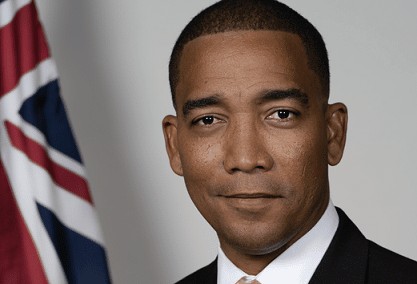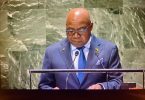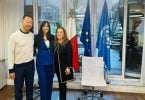After paying tribute to the Queen, the minister of this British Overseas Territory welcomed delegates attending the Caribbean IATA conference this morning.
This is a transcript of his remarks:
by Hon. Kenneth Bryan,
Good morning Excellency, distinguished ladies and gentlemen, and colleagues.
I am pleased to extend a warm Caymankind welcome to you all, especially those who have traveled from overseas, particularly for this conference.
I greatly appreciate your presence here and I understand that it took some sacrificing and juggling of priorities to make it happen. This week in particular has been hard on the British Overseas Territories, the Commonwealth of Nations, and the entire world, as we mourn the passing of Her Majesty Queen Elizabeth the Second.
This shows that even though there are other important matters vying for our attention, your presence is an indication that the issues we are about to discuss are also priorities.
But with that said, I am pleased to see so many of you here today.
Dealing with the pandemic over the last 2 years has made us realize just how precious the ability to meet face-to-face is. And it has given us a renewed understanding of the role of aviation in our day to day lives.
Without aviation, bringing people in from all over the world, in person conferences like this wouldn’t be possible. And, while it’s true that we’ve all had to become familiar with Zoom and Teams for business continuity, nothing beats being able to network and ‘press the flesh’ so to speak, like we’re doing now.
In some ways, it seems like the last two years of dealing with the pandemic has flown by – if you’ll pardon the pun – And yet, so much has happened; particularly in the aviation sector, since COVID turned the world upside down, disrupting business operations across virtually every industry.
And aviation, like tourism, was not just one of the first industries hit, but one of the worst hit. Forced virtually overnight to face dwindling passenger traffic, lockdowns and heavy economic losses.
That was not the first time that the aviation industry has grappled with unexpected shocks. And I dare say, it won’t be the last. But whatever the threat, whether from terrorist attack, natural disasters, volcanic ash clouds, or a global pandemic, the industry has shown resiliency time and again, proving that it has the ability – and the agility – to recover.
Against this backdrop, today’s conference is timely. And the theme “Recover, Reconnect and Revive’ is particularly significant, because it captures the essence of what today is all about.
The aviation industry is unquestionably in recovery mode, spurred by the removal of well-intentioned travel restrictions and vaccination requirements. Here in the Cayman Islands, each time travel restrictions were relaxed, a notable corresponding increase in visitor arrivals was recorded.
Other jurisdictions were experiencing similar patterns in arrivals, showing that traveler confidence was returning, and people were ready to reconnect with loved ones and take the vacations they had put off for years.
As the industry moves through the distinct phases of recovery, reconnection and revival, the need to address the challenges and opportunities that existed prior to the pandemic, as well as the new ones that may have emerged, is now even more acute.
I, therefore, applaud IATA for organizing this forum which has brought all sectors of the industry together.
As attendees representing policy-makers, air transport regulators, representatives from the aviation industry, and other stakeholders, your presence is an indication of the willingness of all parties to address those challenges and opportunities with open minds and frank discussions. It will allow us to learn from each other as we work together to bring about meaningful change.
Today’s theme, “Recover, Reconnect and Revive’ applies just as much to tourism as it does to aviation. And I say that because, as the Minister for Tourism and Transport here in the Cayman Islands, I get to see on a day-to-day basis the impact that one has on the other, with the difference being, what the aviation industry calls passengers, the hospitality industry refers to as guests.
Nevertheless, the two industries are interdependent and mutually reinforcing, in the sense that airlift drives tourism, and increased tourism drives air capacity. If one side breaks down, there is an inevitable impact on the other. And this is one of the reasons why it is so important for the tourism and aviation industries to be considered as two parts of the same equation.
There can be no denying that air transport is as resilient as it is indispensable. It lies at the very center of our socio-economic fabric. It underpins social connections and facilitates our access to goods and services – including trade, jobs, health care, and education. Flying is said to be one of the safest and most reliable modes of transportation in the world today, driven by speed, convenience, and connectivity.
So with all that being said. Allow me to ask you a question. Many of you in the room today have traveled in from the region.
How many of you came here directly, or did you have to connect through Miami and perhaps even overnight there?
Within our Caribbean context, is that just the way it is? Or is the lack of efficient East/West connectivity within our region a major vulnerability? Maybe during today’s discussions, we’ll be able to answer questions like these.
Tourism is a significant economic driver for all of us in the region, yet the lack of inter-regional air connectivity often makes traveling to neighboring Islands seem like a long-haul journey. The concept of regional integration, underpinned by a regional visa solely to facilitate travel by tourists, has been talked about for decades, and to date, those discussions have not led to any tangible actions or conclusions.
Strategically improving regional connectivity could potentially transform this region. It could have a positive impact on our national tourism markets. Visitors could fly to one Island and fly home from another.
Turning that potential into a reality would require a thorough analysis of the pros and cons and a cohesive and coordinated effort if we decided to give it a try.
I don’t pretend to have all the answers. But since today is all about examining our issues and exploring possibilities, I am looking forward to an insightful discussion on multi-destination tourism and to hearing the perspectives of the distinguished panelists – Hon. Edmund Bartlett, Hon. Lisa Cummins and Hon. Henry Charles Fernandez will be joining me for that debate later today.
Also pertinent to this discussion is the fireside chat with Dr. Gene Leon, President of the Caribbean Development Bank, which explores how private sector financing and partnerships might play a role. Access to funding, or at least knowing where the resources could potentially come from, is absolutely critical to the concept of multi-destination tourism, so I will be listening intently.
Ladies and gentlemen, new challenges will always be on the horizon, but it’s how we respond to them that determines the ultimate outcome.
When faced with the absence of passengers, airlines quickly pivoted and used their immense global connectivity to keep vital supply chains functioning. Lifesaving vaccines, medical supplies, and cargo were transported around the world to enable trade with other industries to continue.
Here in the Cayman Islands, our air bridge with the United Kingdom provided a reliable conduit for vaccines and essential supplies, and we are very grateful to the UK, and our airline partner British Airways, for their support during that time of crisis.
Now, with the transition to recovery mode, the aviation sector is still playing an important role in our ever-shrinking, globalized world. The good news is that while the future might be unpredictable, steps can always be taken to help influence how it unfolds.
The 2019 Aviation Benefits Report published by the International Civil Aviation Organisation (ICAO), in collaboration with the global aviation industry, states that, and I quote ‘If the global aviation sector were a country, its total contribution direct, indirect and induced of US 2.7 trillion Dollars, to the gross domestic product (GDP), and the 65.5 million jobs it supports, would be comparable to the United Kingdom’s economic size and population.’ Unquote.
Granted, that was prior to the pandemic, but what it underscores is the aviation industry’s powerful stature as a global economic engine.
To function at that level, countries all around the world, especially Caribbean destinations that depend so heavily on tourism, require infrastructure that doesn’t just facilitate passenger movements but also serves as an enabler for diversification and can facilitate expansion into emerging markets.
The panel discussion immediately following my remarks looks at infrastructure in the Caribbean in the context of opportunities, challenges, and best practices. I am looking forward to hearing more on this subject from the distinguished panelists because having the right infrastructure in place to support airline operations is fundamental to our national interests and to the interests of the region as a whole.
And speaking of airline operations, something I think we can all agree on is that barring any more pandemics and unforeseen catastrophes, the demand for air travel is very likely to grow for decades to come.
And as air travel rebuilds, sustainability will increasingly become a key focus, as the aviation sector is called upon to be greener and more efficient with respect to equipment and facilities.
It is incumbent on us as policy and decision-makers to be mindful of the ramifications that our decisions can have on future generations.
In keeping with this conference’s theme – “Recover, Reconnect, Revive” – the pandemic afforded our natural environment time to recover. It allowed us to reconnect with nature and acknowledge the importance of natural areas for our health and well-being.
I am proud to be part of a Government that approved the purchase and expansion of protected areas on all three Cayman Islands during this time.
Many of these areas support recreation and tourism-related activities and in conjunction with existing marine protected areas, may assist our smallest island Little Cayman – known for its unique natural character and charm – in its bid for UNESCO World Heritage Site status. (But that’s in its early stages.)
The pandemic sparked a greater appreciation of our Sister Islands as domestic travel destinations and revealed the critical role that ‘staycations’ played in keeping their localized economies afloat; while offering much-needed opportunities to mentally recharge. The value of having our own national airline to facilitate this type of inter-island travel cannot be understated.
Ladies and Gentlemen, the mindset of travelers is changing, and the focus on sustainable travel is a rapidly growing trend. Travelers are increasingly showing interest in reducing the environmental impact of tourism, and to be successful, we have to say ahead of the game because this is what our customers expect of us.
To borrow a phrase from my Director of Tourism, Mrs. Rosa Harris, ‘Airlift is the oxygen in our tourism industry, which means airlift brings the market to our product.
As tourism-dependent territories, we would not survive long without our airline partners bringing people from all over the world to enjoy the many wonderful experiences we have to offer.
Air connectivity is the cause and the effect of the growth of tourism, and the future is bright. So bright, in fact, that United, American, and Japan airlines have announced plans to invest in supersonic airliners and “return supersonic speeds to aviation” in the year 2029. The new aircraft is designed to use 100% sustainable fuel, making them a net-zero carbon.
Could flying at Mach 1 speeds of 1300 miles an hour really be the future of aviation? I’m not so certain….but that’s a question for another day.
Today, we have plenty of thought-provoking and relevant topics to keep us engaged for the entire day. When I think of the things that unite us as a region, it is evident that when we are united, we can be unstoppable.
And that is the kind of strength – the strength in togetherness – that I hope we can harness in the future. And use it as a catalyst for creating greater economic benefits for our Islands and the region as a whole.
So today, I am looking forward to pooling our collective wisdom and collaboratively addressing the issues that are central to the economic and social well-being of our Territories.
I anticipate that the conversations will be candid and lively, and that’s not necessarily a bad thing – because we need to speak, as well as listen, to understand each other’s points of view.
As the new chairman of the Caribbean Tourism Organization, I am committed to creating many more opportunities for candid discussions by bringing the stakeholders together and finding the best ways forward.
And so, without further ado, I’d like to sincerely thank every one of you for taking the time to join us at this very important summit. I hope that by the time you leave here, we will have given you some things to think about; some things to talk about; and some memories of our beautiful Cayman Islands that will stay with you forever.
Thank you, Ladies and Gentlemen. It is my pleasure to be your host, and I wish you all a wonderful day.
(eTN): Cayman Islands Tourism Minister told IATA delegates | re-post license | post content























